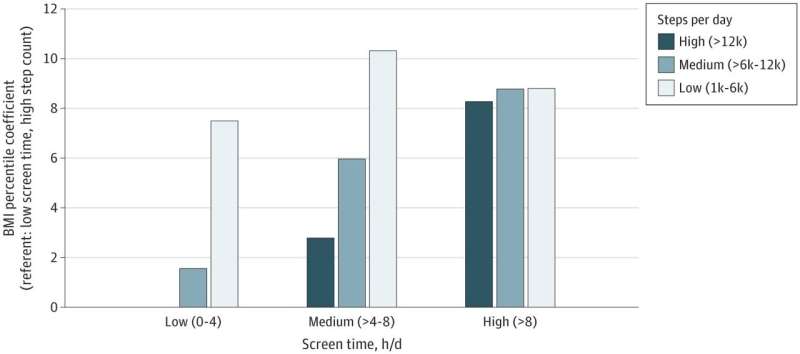This article has been reviewed according to Science X's editorial process and policies. Editors have highlighted the following attributes while ensuring the content's credibility:
fact-checked
peer-reviewed publication
trusted source
proofread
High physical activity does not offset obesity risk among preteens with high screen time

The American Academy of Pediatrics updated its guidance for evaluating and treating obesity last month, recommending proactive treatment for children and teens. But despite the fact that behavioral recommendations for obesity often recommend more physical activity and less screen time, there's been little research on how combinations of physical activity and screen time can impact children's weight.
A new national study published in JAMA Network Open has now found that high physical activity does not offset obesity risk among preteens who reported eight or more hours of screen time per day.
"Spending most of one's free time in front of screens can replace time for other important activities including physical activity, socialization, and sleep," says lead author Jason Nagata, MD, assistant professor of pediatrics at the University of California, San Francisco.
The study also found that low levels of screen time did not offset obesity risk among teens who reported low levels of physical activity.
Co- author Kyle T. Ganson, Ph.D., assistant professor at the University of Toronto's Factor-Inwentash Faculty of Social Work recommends that parents encourage their children to move more through playful activities, sports, and time spent outdoors. "Participating in physical activities as a family are important ways to connect and strengthen relationships," Ganson says.
The researchers asked 5,797 preteens 10-14 years old how much time they spent on screens and measured their daily steps using a Fitbit. At the beginning of the pandemic, preteens reported an average of eight hours of recreational screen time daily.
In another recent study published in the Journal of General Internal Medicine, Nagata found that screen time in adolescence was associated with obesity, diabetes, and higher waist circumference 24 years later. That study followed a nationally representative sample of 7,105 adolescents for 24 years.
"Parents should have regular conversations with their children about screen use and discourage excessive time spent on screens," said Nagata. "They could encourage screen-free time before bedtime or during family meals. Parents can also act as role models for their children with their own screen time and physical activity."
More information: Jason M. Nagata et al, Association of Physical Activity and Screen Time With Body Mass Index Among US Adolescents, JAMA Network Open (2023). DOI: 10.1001/jamanetworkopen.2022.55466
Jason M. Nagata et al, Screen Time from Adolescence to Adulthood and Cardiometabolic Disease: a Prospective Cohort Study, Journal of General Internal Medicine (2023). DOI: 10.1007/s11606-022-07984-6


















